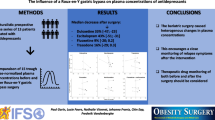Abstract
Background
Many patients seeking bariatric surgery have a history of mood disorders and are actively prescribed antidepressants. While extensive documentation exists on the impact of weight loss surgery on reductions in cardiac, diabetic, and hypertensive medications, little is known about the impact of bariatric surgery on the use of antidepressant medications.
Methods
A retrospective study of 439 patients who had undergone Roux-en-Y gastric bypass (RYGB) from January 2001 to November 2004 was examined for postoperative changes in the use of antidepressant medications.
Results
After RYGB, 23% of the patients had an increase in their antidepressant use, 40% continued to require the same antidepressant, 18% had a change in antidepressant medication, and only 16% had a decrease or discontinued their antidepressant.
Conclusion
Unlike most medications, antidepressant usage did not decrease in the majority of patients after RYGB. These results highlight the prevalence of antidepressant prescription use in patients before and after RYGB and support the need for the careful monitoring of depressive symptoms.

Similar content being viewed by others
References
Santry HP, Gillen DL, Lauderdale DS. Trends in bariatric surgical procedures. JAMA. 2005;294:1909–17.
American Society for Bariatric Surgery. Fact sheet. http://www.asbs.org/Newsite07/media/asmbs_fs_surgery.pdf. Accessed December 27, 2010.
Collazo-Clavell ML, Clark MM, McAlpine DE, et al. Assessment and preparation of patients for bariatric surgery. Mayo Clin Proc. 2006;81:S11–7.
Halmi A. KA, Long M, Stunkard AJ et al. Psychiatric diagnosis of morbidly obese gastric bypass patients. Am J Psychiatry. 1980;137:470–2.
Black DW, Goldstein RB, Mason EE. Prevalence of mental disorder in 88 morbidly obese bariatric clinic patients. Am J Psychiatry. 1992;149:227–34.
Rosik CH. Psychiatric symptoms among prospective bariatric surgery patients: rates of prevalence and their relation to social desirability, pursuit of surgery, and follow-up attendance. Obes Surg. 2005;15:677–83.
Sarwer DB, Cohn NI, Gibbons LM, et al. Psychiatric diagnoses and psychiatric treatment among bariatric surgery candidates. Obes Surg. 2004;14:1148–56.
Powers PS, Rosemurgy A, Boyd F, et al. Outcome of gastric restriction procedures: weight, psychiatric diagnoses, and satisfaction. Obes Surg. 1997;7:471–7.
Clark MM, Niaura R, King TK, et al. Depression, smoking, activity level, and health status: pretreatment predictors of attrition in obesity treatment. Addict Behav. 1996;21:509–13.
Segal JB, Clark JM, Shore AD, et al. Prompt reduction in use of medications for comorbid conditions after bariatric surgery. Obes Surg. 2009;19:1646–56.
Wadden TA, Sarwer DB, Womble LG, et al. Psychosocial aspects of obesity and obesity surgery. Surg Clin North Am. 2001;81:1001–24.
Batsis JA, Lopez-Jimenez F, Collazo-Clavell ML et al. Quality of life after bariatric surgery. Am J Med. 2009;122: 1055.e1-10.
Zwaan M, Enderle J, Wagner S et al. Anxiety and depression in bariatric surgery patients: a prospective, follow-up study using structured clinical interviews. J Affect Disord 2011; in press.
Hayden MJ, Dixon JB, Dixon ME, et al. Characterization of the improvement in depressive symptoms following bariatric surgery. Obes Surg. 2011;21:328–35.
Assimakopoulos K, Karaivazoglou K, Panayiotopoulos S, et al. Bariatric surgery is associated with reduced depressive symptoms and better sexual function in obese female patients: a one-year follow-up study. Obes Surg. 2011;21:362–66.
Clark MM, Hanna BK, Mai JL, et al. Sexual abuse survivors and psychiatric hospitalization after bariatric surgery. Obes Surg. 2007;17:465–9.
Potteiger CE, Paragi PR, Inverso NA, et al. Bariatric surgery: shedding the monetary weight of prescription costs in the managed care area. Obes Surg. 2004;14:725–30.
Batsis JA, Romero-Corral A, Collazo-Clavell ML, et al. Effect of bariatric surgery on the metabolic syndrome: a population-based, long-term controlled study. Mayo Clin Proc. 2008;83:897–907.
Kendrick ML, Clark MM, Collazo-Clavell MD, et al. The multidisciplinary team in a bariatric surgery program. In: Buchwald H, Cowan Jr GSM, Pories WJ, editors. Surgical Management of Obesity. Philadelphia: Elsevier Science; 2006. p. 425–31.
Krukowski RA, Friedman KE, Applegate KL. The utility of the Beck Depression Inventory in a bariatric surgery population. Obes Surg. 2010;20:426–31.
Hayden MJ, Dixon JB, Dixon ME, et al. Confirmatory factor analysis of the Beck Depression Inventory in obese individuals seeking surgery. Obes Surg. 2010;20:432–39.
Demyttenaere K, Jaspers L. Bupropion and SSRI-induced side effects. J Psychopharmacol. 2008;22:792–804.
Sussman N, Ginsberg DL, Bikoff J. Effects of nefazodone on body weight: a pooled analysis of selective serotonin reuptake inhibitor- and imipramine-controlled trials. J Clin Psychiatry. 2001;62:256–60.
Aronne LJ, Segal KR. Weight gain in the treatment of mood disorders. J Clin Psychiatry. 2003;64:22–9.
Schwartz TL, Nihalani N, Jindal S, et al. Psychiatric medication-induced obesity: a review. Obes Rev. 2004;5:115–21.
Schwartz TL, Nihalani N, Virk S, et al. Psychiatric medication-induced obesity: treatment options. Obes Rev. 2004;5:233–8.
Vanina Y, Podolskaya A, Sedky K, et al. Body weight changes associated with psychopharmacology. Psychiatr Serv. 2002;53:842–7.
Virk S, Schwartz TL, Jindal S, et al. Psychiatric medication induced obesity: an aetiologic review. Obes Rev. 2004;5:167–70.
Padwal R, Brocks D, Sharma AM. A systematic review of drug absorption following bariatric surgery and its theoretical implications. Obes Rev. 2010;11:41–50.
Seaman JS, Bowers SP, Dixon MS, et al. Dissolution of common psychiatric medications in a Roux-en-Y gastric bypass model. Psychosomatics. 2005;46:250–3.
Sarwer DB, Faulconbridge LF, Steffen KF, et al. Changes in the gastrointestinal tract and body weight can alter drug absorption. Current Psych. 2011;10:19–29.
McAlpine DE. How to adjust drug dosing after bariatric surgery. Current Psych. 2006;5:27–8.
Miller AD, Smith KM. Medication and nutrient administration considerations after bariatric surgery. Am J Health Syst Pharm. 2006;63:1852–7.
American Psychiatric Association. Practice guideline for the treatment of patients with major depressive disorder (revision). Am J Psychiatry. 2000;157:1–45.
Author information
Authors and Affiliations
Corresponding author
Rights and permissions
About this article
Cite this article
Cunningham, J.L., Merrell, C.C., Sarr, M. et al. Investigation of Antidepressant Medication Usage after Bariatric Surgery. OBES SURG 22, 530–535 (2012). https://doi.org/10.1007/s11695-011-0517-8
Published:
Issue Date:
DOI: https://doi.org/10.1007/s11695-011-0517-8




